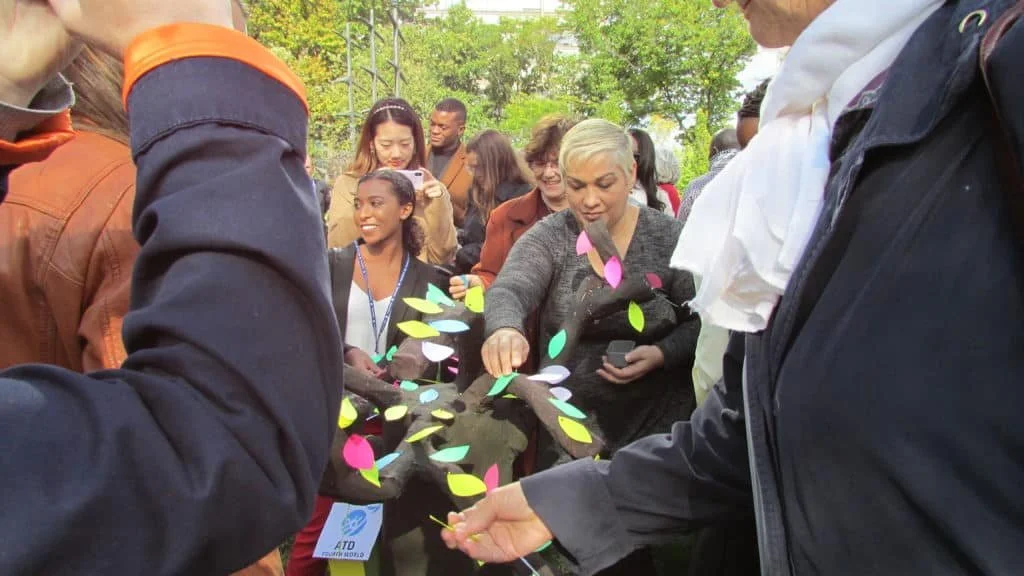2018 International Day for the Eradication of Poverty
Each year, October 17 marks the International Day for the Eradication of Poverty. On this day, people from diverse backgrounds gather all around the world to commemorate the Day, and listen to people with lived experience in poverty as they share not only their experiences and knowledge of poverty but also hopes and courage to overcome their situations. This day serves as a great reminder that poverty cannot be eradicated without the active participation and involvement of those experiencing poverty on a daily basis.
2018 marks the 70th anniversary of the proclamation of the Universal Declaration of Human Rights. It was therefore important to recall the fundamental connection between extreme poverty and human rights, and to remind that people living in poverty are disproportionately affected by many human rights violations. It was also crucial to listen to those living in poverty and suffering from human rights violations in order to learn from their firsthand experiences.
This year, the commemoration was moderated by two wonderful Masters of Ceremony: Rosa Almanzar from Project Hope in Boston and Fatoumata Cisse from Hyde Leadership Charter School in Bronx.
UN Secretary-General Mr. António Guterres gave an opening remark. He emphasized that poverty is not inevitable, and very importantly, that "ending extreme poverty is not a matter of charity, it is a question of justice."
Ms. Inga Rhonda King, President of the Economic and Social Council (ECOSOC), emphasized that inclusive participation of those living in poverty is at the heart of the mission at ECOSOC.
Mr. Francois Delattre, Ambassador, Permanent Representative of Permanent Mission of France to the United Nations, spoke of the importance of the partnership with people living in poverty. Mr. Delattre also mentioned that the fight for the eradication of poverty is the mother of the common fight for peace, development, human rights, and dignity.
Mr. Yemdaogo Eric Tiare, Ambassador, Permanent Representative of Permanent Mission of Burkina Faso to the United Nations, reaffirmed the urgency to take actions to stop poverty today. Mr. Tiare reminded us of the importance of helping each person to regain dignity, promoting solidarity to improve our lives together, and offering pathways to more integration of each segment of society.
https://twitter.com/icoct17/status/1052736093039329280
This year, ATD Fourth World delegates from United States, Tanzania, and Kenya came to share their messages about their experiences of overcoming poverty. Their messages represented the ubiquity of poverty, from developed countries to developing countries, and from Global South to Global North. They were powerful in showing the struggle and dignity of people living in poverty, and conveyed the hope to fight against poverty for themselves and their communities.
ATD Fourth World Volunteer Corps member from Tanzania, Mr. Salehe Mussa Seif, spoke on behalf of Ms. Asha Mohammed, who was not able to come to the United Nations as her visa was denied due to her low income. He expressed that people living in poverty have contributions to make and therefore their participation is crucial in making policies.
Next, Ms. Kimberly Cook, Activist and Human Rights Defender from Boston, shared about the struggles related to living in a shelter and stated that public education is needed to end discrimination against people living in poverty. “We are stronger together," she said.
Mr. Patrick Matara, Activist and Human Rights Defender from Kibera, Kenya. Mr. Matara claimed that human beings, especially children, should be treated with dignity. He said: “We must be friends to those who have been marginalized. We must respect them and value them."
https://twitter.com/icoct17/status/1052735792488046592
Ms. Stacy White, Activist and Human Rights Defender from New York City, strongly claimed that everyone should have the right to speak, to be heard, and to listen to someone.
For an interlude, Ms. Susan McKeown and Mr. Michael Brunnock performed a beautiful song called “Be Change," which was written based on the testimonies of people living homeless in Dublin, Ireland.
The commemoration continued in the UN gardens. Mala and Dancers demonstrated the importance of coming together despite our culture differences through the dance performances. The performance ended with the words of Maya Angelou: “We are more alike, my friends, than we are unalike.”
https://www.facebook.com/ATDFourthWorldUSA/videos/457044968036502/
After the dance, the ceremony resumed with the reading of the text of the Commemorative Stone in Honor of the Victims of Extreme Poverty. 70 years ago, the Universal Declaration of Human Rights was signed on the Trocadero Plaza in Paris. The commemorative Stone at the UN Gardens is a replica of the Commemorative Stone that was inaugurated on the Plaza. The message written on this Stone - proclaiming that extreme poverty is a violation of human rights - is no less relevant today than more than half of a century ago. The message of the Commemorative Stone was read in the six official UN languages by children and young people from the Lycée Français de New York and from the Hyde Leadership High School from the Bronx.
The ceremony finished with all the participants coming together to perform a symbolic gesture around the Human Rights Tree that was made by the Fourth World Activists in New York. The audience was invited to stick colored leaves on the tree. Each color of the leaves symbolized a human right as defined by people in poverty and this gesture represented the hope for everyone having access to these rights. The whole gesture was accompanied by the United Nations Orchestra. The commemoration this year demonstrated the importance of people coming together to eradicate poverty and to stand in solidarity with those experiencing the violence of poverty. Participation of people living in poverty is crucial and their voices and experiences should be at the heart of policy making. Only with their meaningful participation can their dignity and human rights be respected, and a more inclusive society be achieved.


